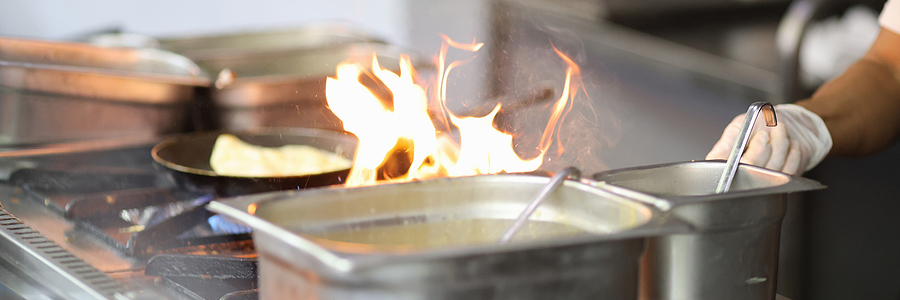Kitchen fires are an ever-present danger in restaurants and commercial kitchens. The combination of open flames, hot surfaces, combustible oils and greases, and miles of electrical wiring makes restaurant kitchens uniquely vulnerable to fires. According to the National Fire Protection Association (NFPA), restaurants experience an average of 7,640 reported structure fires per year, resulting in two civilian deaths, 130 civilian injuries, and $172 million in direct property damage.
The good news is that most kitchen fires are preventable with proper safety precautions and protocol. In this guide, we’ll explore the most common causes of kitchen fires and detailed strategies that restaurants can implement to reduce their fire risks. We’ll also provide helpful tips that every member of your team should know, from managers to line cooks. With a layered approach to fire safety, your restaurant can operate with greatly reduced chances of a serious kitchen fire event.
Most Common Causes of Restaurant Kitchen Fires
There are four leading causes of fires starting in commercial kitchens:
- Cooking equipment: The number one source of kitchen fires is cooking equipment like ovens, stovetops, broilers, and deep fryers. The CDC estimates that cooking equipment accounts for a full 44% of restaurant fires. Fires can start due to overheated oil, loose wiring in appliances, or simply operator error.
- Electrical malfunctions: Faulty electrical wiring, outlets, and appliances are another very common trigger for restaurant fires. Kitchens contain a high density of electronics and the constant plugging in and unplugging of devices creates wear and tear. Damaged wires and outlets may spark, ignite nearby grease, and cause larger fires.
- Improper cleaning: Failure to adequately clean kitchen equipment is another major fire hazard. Built-up grease on surfaces like stoves, ovens, and exhaust hoods can readily ignite. Similarly, overflowing grease traps are a common culprit.
- Gas leaks: Natural gas and propane leaks introduce both fire and explosion risks. Leaked gas may linger, then ignite at any moment due to a burner flame or electrical device. Even small leaks should be treated as emergencies.
Key Strategies for Preventing Kitchen Fires
Luckily, with proactive planning and investment, restaurants can either prevent fires outright or greatly control their spread. Here are the most important tactics and countermeasures to implement:
- Regularly clean and inspect cooking equipment: Appliances should be cleaned thoroughly each night to remove grease buildup. Additionally, a professional hood cleaning service should inspect and clean ventilation systems quarterly. Check that gas lines and burners are not leaking before use.
- Install and maintain fire suppression: Commercial grade fire suppression systems use sensors to automatically deploy extinguishing agents. They’re able to detect and quell flames before they spread. Systems should be professionally installed and inspected twice a year.
- Enforce strict protocols around open flames: Develop clear rules about limiting open flames like candles or torches which are purely decorative. Ensure flambé dishes are only prepared under vent hoods. Identify designated smoking areas safely away from the kitchen.
- Conduct fire drills and train kitchen staff: Practice emergency evacuation and communication procedures regularly, at least every 6 months. Ensure all employees understand proper use of fire extinguishers. Emphasize that staff should not put themselves at risk fighting fires.
- Address electrical issues immediately: Do not ignore warning signs like flickering lights, burning smells, or sparks from outlets. Unplug and stop using any suspect devices. Contact an electrician to fully inspect wiring and replace worn components.
Helpful Fire Safety Tips for Restaurant Teams
Every team member should be vigilant about fire risks, not just managers. Here are important tips for all restaurant employees:
For Cooks:
- Keep cooking areas free of clutter and grease buildup
- Double check that equipment is turned fully off when not in use
- Use caution when cooking with open flames like torches
- Never leave cooking food unattended
- Report any gas smells immediately
For Servers:
- Take care not to bump into or brush against hot cooking equipment
- Know the location of all fire extinguishers and alarm pull stations
- When evacuating, assist guests in staying calm and exiting carefully
- If qualified, help extinguish flames using the PASS method (pull pin, aim, squeeze, sweep)
For Managers:
- Ensure fire systems are professionally inspected twice a year
- Confirm the kitchen is equipped with proper extinguishers (Class K for kitchens)
- Review evacuation routes and protocols every 6 months
- Provide regular refreshers on fire safety for both BOH and FOH staff
- Have an emergency contact list handy to notify fire department and ownership
Making sure kitchen fire prevention, preparedness, and response procedures will help keep your restaurant run safely. Empower your team to be active participants in fire safety and you’ll likely avoid disaster. With full awareness from the dishwasher to the general manager, your establishment can operate securely and profitably for years to come.
